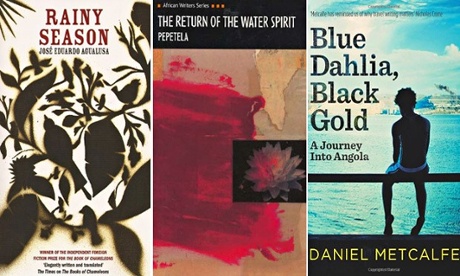
Rainy Season by José Eduardo Agualusa, translated by Daniel Hahn
Agualusa’s novel, ostensibly about the life of Angolan poet and activist Lidía do Carmo Ferreira – who mysteriously vanished in Luanda in 1992 – depicts his country’s tortured history in the second half of the 20th century. Independence in 1975, after a long anti-colonial struggle against Portugal, brings cause for celebration but also marks the beginning of three decades of civil war.
Agualusa entwines fact and fiction to introduce a host of characters whose lives interconnect, and the story flits between the colonial era, the civil war and the present. But he never loses control of his tangled web of a tale, told mostly by a journalist investigating the disappearance of Carmo Ferreira.
Rivalry between the anti-colonial groups and factionalism within the ruling People’s Movement for the Liberation of Angola (MPLA) spiral into chaos and violence. Intellectuals and artists are caught up in the internecine struggle, which devastates the country and brings new horrors as rebels and dissidents are jailed, tortured and killed.
The urgent, lyrical prose brings home the torment and disillusionment as the Angolan revolution feeds on its protagonists and destroys their idealism.
Haunting, anguished and sometimes harrowing, Rainy Season is both intellectually and emotionally absorbing.
Journalist and writer Agualusa, who was born in Huambo, divides his time between Angola and Portugal.
The Return of the Water Spirit by Pepetela, translated by Luís R Mitras
Pepetela’s political fable is a stinging critique of corruption in post-colonial Angola. It’s set during the late 1980s and early 1990s as the socialist MPLA government embraces capitalism and the disgruntled Unita opposition rekindles the civil war.
Carmina Evangelista, an energetic and ambitious ruling party member – and once-fanatical leftwinger – switches seamlessly from Marx to market forces, and makes a fortune supplying arms to the government.
Her lazy, obsequious husband, João, consumed with playing computer games, rarely bothers to turn up for work as a government employee.
Meanwhile, the buildings in the capital’s central Kinaxixi Square are mysteriously crumbling – a phenomenon dubbed “Luanda Syndrome” – baffling engineers and scientists. Is it God’s punishment for a degenerate society, sabotage by the Americans, or the water spirit, Kianda, reclaiming the land for the lagoon it once was?
The only glimmer of hope comes from the grassroots “naked movement”, led by those left with nothing after their homes are reduced to rubble.
The novel offers a short, sharp satire on a decaying country whose people have been betrayed by their leaders.
Pepetela is the guerrilla alias and pen name of former MPLA combatant and ex-deputy minister Artur Carlos Maurício Pestana.
Blue Dahlia, Black Gold by Daniel Metcalfe
Welcome to Angola … a petrostate of plenty amid grinding poverty where beer costs less than bottled water and the oil-soaked rich are buying up chunks of Portugal, home of the former colonisers.
Metcalfe, an intrepid traveller in this “anti-tourist destination”, has an insatiable curiosity and a determination to get under the skin of this complex and contradictory country. Weaving history and politics into his travelogue, he tells of the brutal Portuguese colonial era, the crippling 27-year post-independence civil war, and the ruling MPLA party’s iron grip on the state.
An oil boom brings extraordinary wealth, but fails to benefit the vast majority of Angolans as the MPLA eschews Marxism for a cocktail of capitalism, cronyism and corruption.
Metcalfe embarks on bone-jarring journeys across the country, talking to activists, expat landmine clearers, tribal elders and citizens, unfailingly mining interesting stories.
Despite facing something rotten in the state of Angola, there is no doubting people’s resilience. One woman who helps Metcalfe tackle the ubiquitous red tape has “something quietly courageous about her … like a delicate bird in a cage, she found a way to sing”.
The author’s subtle wit and sharp eye are the hallmarks of this enriching and enjoyable introduction to an African powerhouse.
British journalist Metcalfe is the author of a previous travel book on central Asia.
Check out the other countries in our World Library series: Nigeria, Colombia, Vietnam, Egypt, Brazil, Kenya, Indonesia, Libya, Mexico, the Democratic Republic of the Congo, the Philippines, Iran, Peru, Somalia, China, Afghanistan, Haiti, Sudan, Thailand, Argentina and Algeria

